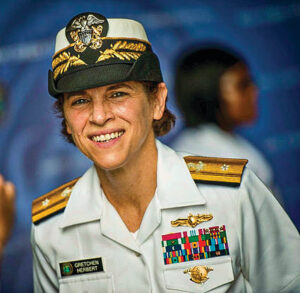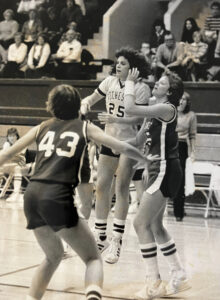In and after the Navy: Rear Admiral Gretchen Herbert ’84
In and after the Navy: Rear Admiral Gretchen Herbert ’84
Sports, the military, and a career full of milestones have marked this alumna’s life

Rear Admiral Gretchen Herbert ’84
When Gretchen Herbert was a teenager, her parents were very realistic with her about the cost of college: They could afford to support four years at a state school or two at a private one. That’s when Herbert’s father started handing her Naval Reserve Officer Training Corps (NROTC) brochures—a timely move because he knew how much his daughter wanted to go to the University of Rochester, her dream school.
“As a high school student, I wasn’t too enthusiastic about NROTC at first, but I knew a scholarship would make it possible for me to go to Rochester,” says Herbert. “So, I filled out the paperwork, was accepted into the program and the University, and looked forward to all the opportunities ahead of me—academically, athletically, and in the Navy.”
Herbert’s experience at the University turned out to be everything she hoped it would be. She loved science and majored in geology. She played soccer as a defender for three years and basketball as a power forward for all four years. NROTC filled her days, too, as she woke up early for training, participated in drills, and completed other Navy coursework throughout the week. She thrived amidst all the hard work.
At Rochester
Herbert’s soccer coach, Terry Gurnett ’77, and her NROTC commanding officer, Colonel Larry Ogle (USMC), provided steady inspiration throughout her college years and beyond. “They were major influencers in my life,” she says. “I learned so much from them and from sports and NROTC—I enjoyed all the training, competition, and studying with my teammates and colleagues, too. We always had each other’s backs, and many of us have become lifelong friends.”
Herbert’s plan was to graduate, serve her required four years in the Navy, and then pursue a civilian career. She didn’t expect to love the Navy, but she did. Those early days in the NROTC formed the bedrock of what would evolve into a 30-year naval career. She retired in 2014 as a rear admiral—one of the military’s higher-ranking positions. Only about six percent of active duty and retired Navy admirals are women.
“Gretchen was always prepared to practice and play,” Gurnett says. “She was the consummate teammate, a joy to coach, and a natural-born leader—everyone loved and respected her. It’s no surprise to me that she went on to have such a successful career.”
Rochester taught me how to be focused, yet flexible. It showed me how to manage priorities, responsibilities, and obligations to myself, my teammates, and my fellow students. It also provided me lessons both on and off the field, which I’ve used throughout my career to better prioritize, manage my time, work as a team towards a common goal, and to collaborate with others.
Being a Navy Woman
 When Herbert graduated in 1984, the U.S. Department of Defense’s combat exclusion policy was still in effect, part of the Women’s Armed Services Integration Act. Passed in 1948, it gave women the ability to join the armed forces during times of peace, but they were not permitted to serve in combat positions. This policy meant that Herbert’s assignment options were more limited than those available to men.
When Herbert graduated in 1984, the U.S. Department of Defense’s combat exclusion policy was still in effect, part of the Women’s Armed Services Integration Act. Passed in 1948, it gave women the ability to join the armed forces during times of peace, but they were not permitted to serve in combat positions. This policy meant that Herbert’s assignment options were more limited than those available to men.
As graduation neared, Herbert sat down with Col. Ogle to talk about what kind of naval assignment she—and any woman—could pursue.
“It was a fortuitous conversation that led to my first assignment, an operational role in an important anti-submarine warfare program that was established during the Cold War,” says Herbert, who spent her first five years in the Navy engaged in anti-submarine warfare, tracking Soviet submarines throughout the Atlantic Ocean.
After repeal of the combat exclusion policy in 1993, Herbert served as a satellite communications officer in London. A few years later, she embarked on her first shipboard tour as the combat systems officer on the USS George Washington, a nuclear aircraft carrier that still operates today with 5,000 service members on board. “That post ended up being the best experience of my career—exciting work, great people, and a mission that was critical to our country’s national security,” she says.
During the early years of her career, Herbert notes, women made up just more than 10 percent of the Navy’s active duty force. Even before the combat exclusion law was rescinded, all of her junior officer assignments were at commands that were well integrated with women. “I never felt like a minority during those tours,” she says. “The gender demographics were similar to what I experienced in the NROTC program at Rochester.”
Being a woman in the Navy continued to be a non-issue for Herbert when she was assigned to commands where women were disproportionately outnumbered by men. “Throughout my career, I have always been encouraged, supported, motivated, and respected,” she adds. “The Navy afforded me tremendous opportunities. I couldn’t ask for a better career.”
Pursuing Excellence

Herbert then spent four years working at the Pentagon until 2011, when she was selected to lead the Navy’s Cyber Forces Command. Its mission was to staff, train, equip, and certify combat-ready cyber forces throughout the Navy. The command was created in recognition of the growing importance of cybersecurity and the need for skilled individuals to protect the country’s intellectual property, operational plans, and military capabilities.
Herbert will tell you that she served alongside those with a wide range of educational backgrounds, including engineering, history, English, and more. She also underscores that the specific degree is not as important as the pursuit of excellence through the educational experience.
Finding Opportunity
Herbert’s career advice for young people? Bloom where you are planted. “In the Navy, you don’t apply for a job because you think it sounds interesting; you are assigned based on your skills, experience, and the military’s needs,” she says. “Every opportunity, no matter how challenging or unplanned, offers something to learn and grow from.”
Upon retirement, Herbert wasn’t interested in continuing in a technical or defense contracting field. Although consulting was an option, she decided to pursue other opportunities.
“I wanted to dig in the dirt, hike every day, and try my hand at more artistic pursuits like refinishing furniture,” she says. “So that’s what I do—I’ve commandeered our garage and have a brush sitting in a bucket of water on most days, ready to bring new life to an old dresser. I also serve on a few boards, including the National Outdoor Leadership School with my husband, Roger, a retired Navy Seal, and I volunteer at our local animal shelter, walking rescue dogs three times a week. Life continues to be an adventure.”
Learn more
- Rochester’s NROTC: 75 years of leadership
- Get to know alumnae through the University’s Women’s Network
- Explore Athletics at Rochester
This story also appears in the summer 2023 issue of Buzz magazine.
— Kristine Kappel Thompson, June 2023


